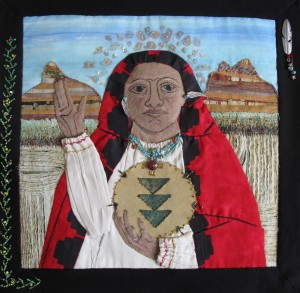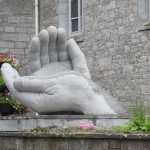As Lughnasadh invites us to gather the bounty of the earth and preserve it for use at a later time, so it invites us to gather other bounty: spiritual, mental, emotional, physical, psychological. Gathering is not to be confused with hoarding. Saving for a rainy day is a fine choice – provided we use those savings when it rains (whether on ourselves or on someone else).
Dolly Levi puts this concept succinctly and humorously, originally in Thornton Wilder’s play, The Matchmaker, and later in the musical made from that play, Hello, Dolly!. She says, “Money is like manure; it’s not worth a thing unless it’s spread around encouraging young things to grow.” The same truth holds for all of our gleanings: they are so much dross that just needs dusting unless we are using them for the common good.
One of the harvests we gather over our lives is forgiveness. But judging by my own heart and the (often ashamed) confessions of others near and dear, forgiveness is something that I resist using, even when I find myself in a (spiritual, emotional, psychological) monsoon. I ask myself what I am hoarding it for and have no answer. I can only assume that it is for a possible meeting with someone like Bashar al-Assad (it used to be Idi Amin, but he died in 2003)…when I would need a truckload just to stay in the same room.
But here’s the thing: forgiveness doesn’t come in truckloads, it comes in heartfuls. Like manna in the book of Exodus, it can’t be saved or stored, it can only be used at the moment. And, like love, the more you give away, the more you have to give away. I can write this fluently and without a shadow of a doubt. Do you think I can do it? Not so much. My fluency turns into French 101 in which I need to translate everything in my head before I say it out loud. And the doubts rise around me like Sleeping Beauty’s hedge.
As in, “Is she aware that she has been treating me with the most shocking contempt? If she isn’t aware, what good will forgiveness do? She’ll just assume her behavior is acceptable and keep doing it.” In mere seconds I have talked myself out of forgiving her – or him – and retreated into self-righteous indigestion. Because that is exactly what it feels like: a huge lump of undigested food sitting right where my heart should be. Meanwhile, the person to whom I have just denied forgiveness is trucking along in whatever mind-set allows her or him to be so hostile in the first place… Not forgiving hasn’t changed the situation one iota for the better.
I wrote the following meditation about four years ago as part of a series of meditations on imprisonment and liberation. I don’t think it is pure coincidence that I rediscovered it this week. I offer it to you on my way to my meditation space to use it myself — probably more than once.
Close your eyes, if you are comfortable doing that. Or you may prefer to use the flame of a candle as a focal point to help your mind be still. Become aware of your breathing and allow it to be slow and deep, until you feel centered and calm.
Let yourself imagine:
A very close friend or family member has been accused of taking a large sum of money. This person came to you a few days ago and told you about the accusation and, without any prompting, also told you that the accusation is true – they did take the money. What is more, it is too late to fix things. This person must go to court and today is the day of the trial.
What are you feeling right now? Try to observe your feelings without any judgment, simply allowing them to be as accurate and as intense as they are. Do you feel horror? fear? anger? disappointment? helplessness? compassion?
You dress and eat something, preparing yourself to go to court to offer what help you can or, if you cannot help, at least to bear witness.
When you arrive, you can see the accused, but you cannot get close enough to speak together. You are separated by the rituals and procedures of the legal system, and by the architecture of the courtroom. You can also see the accuser, sitting in the front of the courtroom with a lawyer. The trial begins and you learn that it is even worse than you imagined. The amount of money is large enough that the accused is facing a sentence of several years in prison.
What are you feeling at this moment? Allow the feelings to be as full and detailed as possible.
Your friend admits to the theft and explains why it occurred, but you are aware from looking at the judge’s face and the faces of the jury that they do not believe this is an acceptable excuse. You know that it will not mitigate the sentence. The judge calls a recess while the jury leaves to deliberate. You can only sit there and wait. What are you feeling as you wait?
Very quickly, the jury is ready to return and they deliver the verdict of guilty. The judge asks if the accused has anything to say before sentence is given. This person you love turns to the accuser and asks forgiveness for the theft, but doesn’t offer any further pleading or justification.
Before the judge can speak, the accuser stands and asks if he can make a statement. The judge looks surprised, but agrees.
The accuser turns to your friend and says, “You are forgiven.” He turns back to the judge and says, “I ask that the accused be allowed to go free. The debt is to me and I will forgive it here and now and renounce all claim to collect it in the future.”
There is a pause while everyone seems to hold their breath. Then the judge strikes the bench with the gavel and says, “Let it be so.” Your friend begins to cry and you fight your way forward through the spectators expressing their surprise at what has happened. You hug your friend in gratitude. When you look up to thank the accuser, the person is gone.
When you are ready, take 3 or 4 more deep breaths and then open your eyes gently and let yourself become centered in the present. Take some time to write or draw some reflections on the meditation, something that you can return to this week and consider again.
May your meditation be bountiful and, if you would like to take some words with you into the week, perhaps you will receive these as a gift.
Holy Welcome,
be the open arms to support me when I am weak.
Be the open heart to forgive me when I have broken covenant.
Be the open door to shelter me when I am afraid.
Be within me the beacon of safety for those in danger.
Be within me the jubilee soul willing to forgive all debts and trespasses.
Be within me the strength to love rather than to judge.
Let it be so.
–Andrea
Text © 2014, Andrea La Sonde Anastos
Photos © 2014, 2011, Immram Chara, LLC
NOTE: “Maize Mother” (the fiber piece) can be seen in the fiber art section of the store. Both photos are available this season as cards or prints from my Etsy Shop.

